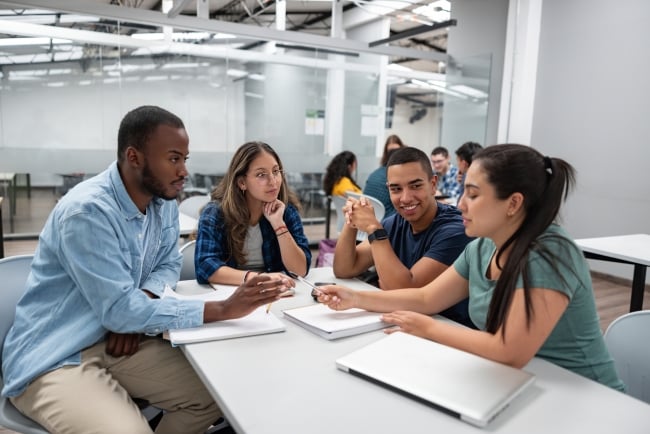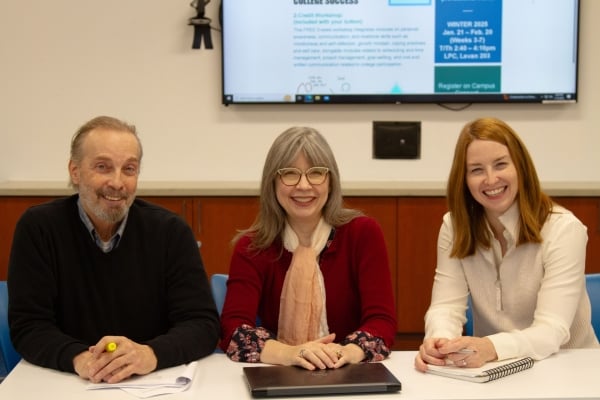You have /5 articles left.
Sign up for a free account or log in.

DePaul University students can complete a two-credit course focused on communication and personal growth to improve their academic and personal pursuits.
andresr/E+/Getty Images
While many students experience growing pains in the transition from high school to college, today’s learners face an extra challenge emerging from the COVID-19 pandemic. Many students experienced learning loss in K-12 as a result of distance learning, which has stunted their readiness to engage fully in academia.
Three faculty members in the College of Communication at DePaul University noticed a disconnect in their own classrooms as they sought to connect with students. They decided to create their own intervention to address learners’ lack of communication and self-efficacy skills.
Since 2022, DePaul has offered a two-credit communication course that assists students midway through the term and encourages reflection and goal setting for future success. Over the past four terms, faculty members have seen demonstrated change in students’ self-perceptions and commitment to engage in long-term success strategies.
The background: Upon returning to in-person instruction after the pandemic, associate professor Jay Baglia noticed students still behaved as though their classes were one-directional Zoom calls, staring blankly or demonstrating learned helplessness from a lack of deadlines and loose attendance policies.
“We were seeing a greater proportion of students who were not prepared for the college experience,” says Elissa Foster, professor and faculty fellow of the DePaul Humanities Center.
Previous research showed that strategies to increase students’ collaboration and participation in class positively impacted engagement, helping students take a more active role in their learning and classroom environment.
The faculty members decided to create their own workshop to equip students with practical tools they can use in their academics and their lives beyond.
How it works: Offered for the first time in fall 2022, the Communication Fundamentals for College Success course is a two-credit, five-week course that meets for two 90-minute sessions a week, for a total of 10 meetings. The class is housed in the College of Communication but available to all undergraduate students.
The course is co-taught and was developed by Foster and Kendra Knight, associate professor in the college of communication and an assessment consultant for the center for teaching and learning. Guest speakers from advising and the Office of Health Promotion and Wellness provide additional perspective.

Aubreonna Chamberlain/DePaul University
Course content includes skills and behaviors taught in the context of communication for success: asking for help, using university resources, engaging in class with peers and professors, and learning academic software. It also touches on more general behaviors like personal awareness, mindfulness, coping practices, a growth mindset, goal setting and project management.
The demographics of students enrolled in the course vary; some are transfers looking for support as they navigate a university for the first time. Others are A students who wanted an extra course in their schedule. Others are juniors or seniors hoping to gain longer-term life skills to apply to their internships or their lives as professionals and find work-life balance.
Throughout the course, students turned in regular reflection exercises for assessment and the final assignment was a writing assignment to identify three tools that they will take with them beyond this course.
What’s different: One of the challenges in launching the course was distinguishing its goals from DePaul’s Chicago Quarter, which is the first-year precollege experience. Baglia compares the college experience to taking an international vacation: While you might have a guidebook and plan well for the experience beforehand, once you’re in country, you face challenges you didn’t anticipate or may be overwhelmed.
Orientation is the guidebook students receive before going abroad, and the Communication for Success Class is their tour guide along the way.
“I think across the country, universities and college professors are recognizing that scaffolding is really the way to go, particularly with first-generation college students,” Baglia says. “They don’t always have the language or the tools or the support or the conversations at home that prepare them for the strangeness of living on their own [and navigating higher education].”
A unique facet of the course is that it’s offered between weeks three and seven in the semester, starting immediately after the add-drop period concludes and continuing until midterms. This delayed-start structure means the students enrolled in the course are often looking for additional credits to keep their full-time enrollment status, sometimes after dropping a different course.
The timing of the course also requires a little time and trust, because most students register for it later, not during the course registration period. Baglia will be teaching the spring 2025 term and, as of Jan. 10, he only has two students registered.
“It has not been easy convincing the administrators in our college to give it some time … Students have to register for this class [later],” Baglia says.
The results: Foster, Knight and Baglia used a small grant to study the effects of the intervention and found, through the data, a majority of students identified time management and developing a growth mindset as the tools they want to keep working on, with just under half indicating self-care and 40 percent writing about classroom engagement.
In their essays, students talked about mapping out their deadlines for the semester or using a digital calendar to stay on top of their schedules. Students also said they were more likely to view challenges as opportunities for growth or consider their own capabilities as underdeveloped, rather than stagnant or insufficient.
The intervention has already spurred similar innovation within the university, with the College of Science and Health offering a similar life skills development course.
Course organizers don’t have plans to scale the course at present, but they are considering ways to collect more data from participants after they finish the course and compare that to the more general university population.
Get more content like this directly to your inbox every weekday morning. Subscribe to the Student Success newsletter here.
This article has been updated to clarify the course and faculty are housed in the College of Communication.




